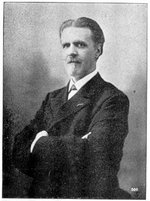Vincent d'Indy
|
|
Paul Marie Théodore Vincent d'Indy (March 27, 1851 – December 2, 1931) was a French composer and teacher.
D'Indy was born in Paris. He had piano lessons from from an early age, but initially studied law to please his family. He was determined to be a musician, however, and became a devoted student of César Franck. In 1894, he co-founded the Schola Cantorum in Paris with Charles Bordes and Alexandre Guilmant and until his death taught music there and at the Paris Conservatoire. Among his pupils were Erik Satie, Bohuslav Martinu, Albert Roussel and Joseph Canteloube (who later wrote his biography). He co-wrote the three volume Cours de composition musicale (1903) and wrote studies of Franck and Ludwig van Beethoven.
Few of d'Indy's works are performed with any regularity today. His best known pieces are probably the Symphonie Cévenole or Symphonie sur un chant montagnard français (Symphony on a French Mountain Air) for piano and orchestra (1886), and Istar (1896), a symphonic poem in the form of a set of variations. Among his other works are other orchestral music, chamber music, piano music, songs and a number of operas, including Fervaal (1897). As well as Franck, d'Indy's works show the influence of Richard Wagner (he attended the premiere of Wagner's Der Ring des Nibelungen at the Bayreuth Festspielhaus in 1876).
D'Indy also helped to revive a number of then-largely forgotten early works, making his own edition of Claudio Monteverdi's opera L'Incoronazione di Poppea, for example.
He died in Paris.
See also
Further reading
- Andrew Thomson, Vincent d'Indy and his World (Oxford University Press, 1996)
External link
- 1932 obituary from the Musical Times (http://www.musicaltimes.co.uk/archive/obits/193201dindy.html)de:Vincent d'Indy
es:Vincent d'Indy fr:Vincent d'Indy ja:ヴァンサン・ダンディ nl:Vincent d'Indy

